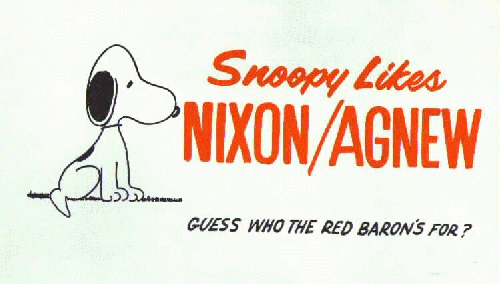|
|
|
 THE 1968 ELECTION was the first for the initial wave of the Baby Boom. Thousands
of people born in 1946 and 1947 participated in the campaign, whether as volunteers,
hecklers, demonstrators, or just plain voters. Naturally the politicians—like Hollywood,
the radio stations and television producers, the pop-music industry, and Madison
Avenue advertisers—went after them. This was no simple task for middle-aged men,
set in their ways, because the youth of 1968 were so rebellious. Their hair styles,
like their clothes and music and literature, reflected their rejection of traditional
mores, and gave their elders the impression that in their nonconformity those kids
were part of the most conformist generation ever.
THE 1968 ELECTION was the first for the initial wave of the Baby Boom. Thousands
of people born in 1946 and 1947 participated in the campaign, whether as volunteers,
hecklers, demonstrators, or just plain voters. Naturally the politicians—like Hollywood,
the radio stations and television producers, the pop-music industry, and Madison
Avenue advertisers—went after them. This was no simple task for middle-aged men,
set in their ways, because the youth of 1968 were so rebellious. Their hair styles,
like their clothes and music and literature, reflected their rejection of traditional
mores, and gave their elders the impression that in their nonconformity those kids
were part of the most conformist generation ever.
But there was diversity
among the Baby Boomers. There were plenty of youngsters around who were square, subdued,
and solidly Republican. The most prominent of these were David Eisenhower and Julie
Nixon. The couple was immensely popular, and not just with Republican parents. Reporter
Charlotte Curtis noted that when David arrived at the St. Louis airport, there was
a throng to meet him, composed of teenaged girls. One ebullient blonde, fourteen
years old, bolted forward when her idol arrived, clutched at his brown tweed sleeve,
and squealed delightedly. "I touched him," she cried. "I actually
touched him."
David, lanky, freckle-faced, jug-eared, with a grin that
reminded older observers of his grandfather, handled such adulation with the aplomb
of a rock star. So did Julie, who also got touched, hugged, and patted wherever she
went. Together, they were America's newest celebrity sweethearts. Young Republicans,
according to Curtis, were "hanging on their every word."
David was
good at grinning; Julie, pert, attractive, carefully groomed, and full of spirit,
was good at answering questions."What about Viet Nam?"hecklers would shout at her.
"Daddy wants the peace talks to succeed so much he thinks he shouldn't talk about the war,"she would answer."When he becomes President, he'll put the pressure on the Soviet Union. Remember, Daddy was with the Eisenhower Administration and they got us out of one war."
from Nixon: The Triumph of a Politician 1962-1972 (1989) by historian Stephen E. Ambrose